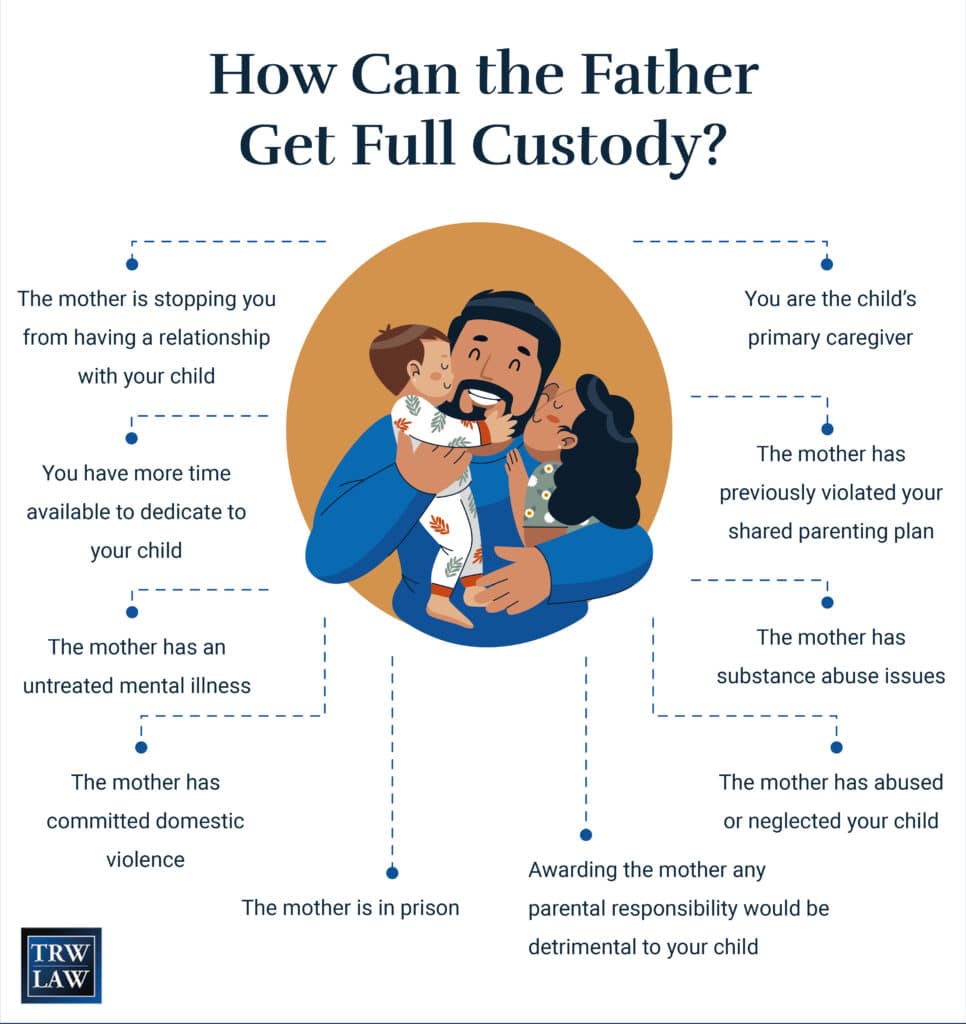- Rare Sole Custody: Full custody, termed “sole parental responsibility” in Florida, is uncommon and granted only if it’s deemed in the child’s best interest and shared custody is impractical or harmful.
- Court’s Focus: Custody decisions hinge on the child’s best interest, considering factors like parental stability, history of abuse, substance use, and the child’s relationship with each parent.
- Detailed Parenting Plan: Crafting a thorough parenting plan outlining childcare, decision-making, visitation schedules, and communication methods can sway custody decisions.
- Demonstrating Suitability: To pursue sole custody, a father must prove it’s best for the child and provide evidence of his ability to meet the child’s needs.
- Unmarried Fathers’ Rights: Unwed fathers must establish paternity but have equal rights in custody cases. Courts assess custody based on the child’s welfare, irrespective of marital status.
The father can only get full custody of a child in some cases in Florida. It usually occurs if the court believes awarding any parental responsibility or visitation rights to the mother would be detrimental to the child. Here at The Law Offices of Travis R. Walker, PA, we’ve prepared a guide on how a father can navigate the challenging path to get full or primary custody in Florida.
It is rare for either parent to get sole custody and parental responsibility of a child in Florida. However, in some cases, either a mother or a father can get full custody of their children.
Florida courts prefer that both parents participate in raising their children and will usually grant each parent time with their children. In Florida, this is known as time-sharing and is separate from determining which parent will have full or primary custody. However, in some situations, a Florida court will consider granting a father sole custody with no shared parental responsibility or time-sharing.
When a Florida court decides whether a parent will get full custody, the court’s sole focus is determining what’s in the child’s best interest. The Law Offices of Travis R. Walker, PA, can help you navigate the custody process and help you build your best case.
“Contrary to common misconceptions, fathers have significant rights under Florida law, including a predisposition to 50/50 custody. It’s essential to dispel myths and advocate vigorously for fathers’ rights in custody, visitation, and support matters.”
-Travis R. Walker | Founder and Philanthropist


Florida Custody Laws
In Florida, parental responsibility and time-sharing are the two central determinations in child custody cases. Parental responsibility refers to each parent’s rights and obligations in the child-rearing process. Time-sharing refers to how parents will keep in contact with their child through visitation and other communication.
No concrete series of steps determines how a custody case in Florida will play out. The judge will determine what is in the child’s best interest based on the evidence presented. Having both parents remain involved in the child’s life is usually considered the best outcome for the child’s well-being. However, there are certain factors a judge considers when determining custody.
The Parenting Plan
The parenting plan lays out the roles and responsibilities of the parents as it pertains to:
- Childcare and decision-making authority for health care and school
- Visitation schedule or arrangements
- How parents can communicate with children (via email, phone, etc.)
The parenting plan can influence which parent will get primary custody. [View Doc]. For example, if the parenting plan dictates a specific school choice, the court will consider whether the travel time required from a parent’s residence will be too disruptive to school-aged children.
Most parents benefit from working together to create a parenting plan. If you and the mother agree on a parenting plan, you might be able to skip a trial, saving time and thousands of dollars.
If you cannot agree with the mother, you can propose your own parenting plan that provides for primary or sole custody. Presenting this in court demonstrates that you’ve considered all the details of how to parent together before requesting sole custody.
If the court believes the child is fully capable of having a preference, the court can consider the child’s preference as well [View Doc].
Other Factors That Impact Custody
Here are some other factors that have an impact on Florida child custody cases: [View Doc]
- Whether parents can demonstrate that they want to have and can facilitate a continuing close relationship with the child
- Whether the judge perceives that parents will be more likely to act in their child’s best interests rather than their own
- Whether the child is already living in a “stable, satisfactory environment” with a preference for maintaining continuity
- Whether parents know specific details about their child’s life
- Whether parents will be able to provide a consistent routine for the child
- The mental and physical health, and moral character, of both parents
- The geographic viability of the parenting plan
- Child support agreements
How Can the Father Get Full Custody?
It’s rare for one parent to be granted full custody without visitation in Florida. But, Florida Statute 61.13 (d)(3) lists some factors that would influence the court to make such an exception:
- You are the child’s primary caregiver
- The mother has previously violated your shared parenting plan
- The mother is stopping you from having a relationship with your child
- You have more time available to dedicate to your child
- The mother has substance abuse issues
- The mother has an untreated mental illness
- The mother has abused or neglected your child
- The mother has committed domestic violence
- The mother is in prison
- Awarding the mother any parental responsibility would be detrimental to your child
Even in some of these extreme circumstances, the court might try to still give the mother time with her children via supervised visits or by revisiting the parental responsibility and time-sharing plans later if she can improve her situation.
Getting Full Custody In Florida
Sole Parenting Responsibilities
In Florida, parents usually get “shared parental responsibility” for their child [View Doc]. This can either mean each parent is solely responsible for specific aspects of the child’s welfare, such as health care or education decisions, or that the decisions and responsibilities are equally divided between both parents.
What is colloquially referred to as full custody is actually called “sole parental responsibility” under Florida law. [Florida Legislature[View Doc].
Sole parental responsibility means you’ll be responsible for every aspect of raising your child, 24 hours a day, seven days a week, and you’ll be able to make all child-rearing decisions. If you’re a father looking to gain sole parental responsibility, you should show the court you can commit the required time and effort.
Regardless of how parental responsibility is divided, it is important to remember that parental responsibility is a separate concept from time-sharing.
What is Time-Sharing?
Except in extreme circumstances, a parent with no parental responsibility will usually still have visitation rights in Florida. The time-sharing agreement dictates how this parenting time is divided and managed. The parenting plan you propose to the court should outline both the division of parental responsibility and a time-sharing schedule.
Although the specific divisions of time will differ from family to family, parents will end up splitting their time-sharing arrangement into either:
Equal shares — 50/50 schedules, such as seven days with one parent, then seven days with the other
Majority/minority shares — an uneven balance of time, such as weekdays with one parent and weekends with the other
Courts may require supervised or restricted visits for the child’s safety. A parent can lose their time-sharing rights in circumstances of child abuse, domestic violence, abandonment, or neglect. In such a situation, “sole parenting time” can be awarded to the other parent.

Custody Rights for Unmarried Fathers
A mother automatically becomes the legal parent of any child she gives birth to. And under Florida Statute 382.013 (2)(a), the husband is assumed to be the father of any children born during a marriage.
But when the parents are unmarried, the father must establish paternity before pursuing full custody of his child. You may not have any rights to custody in Florida without proof that you are the child’s biological or legal father.
Once you have acceptable proof of paternity, you won’t be disadvantaged when applying for full custody. Both parents start a custody determination on equal footing under Florida law. Florida custody laws no longer allow courts to treat a father as the less important parent, regardless of whether the child’s parents are married.
Florida public policy encourages courts to ensure “each minor child has frequent and continuing contact with both parents.” That means the courts no longer favor a child’s mother when determining custody. From there, courts make parental responsibility and time-sharing decisions on a case-by-case basis.
Under the right circumstances, getting full custody is no more of an uphill struggle for an unmarried father than for a father married to the child’s mother. Once you’ve established paternity, the court will evaluate your case to determine what’s in your child’s best interest, just as it would if you were married to the child’s mother.
Work With a Lawyer Who Understands Parental Custody in Florida
Custody cases are stressful, and seeking sole custody as a father can seem daunting. An experienced Florida custody lawyer can provide compassionate guidance and aggressive advocacy to help you navigate the custody process.
We will protect your rights and help you navigate this complicated process. Contact the experienced team of family law attorneys at Travis Walker Law.
Contact the Law Offices of Travis R. Walker for Legal Services Regarding Power of Attorney or Guardianship
You and your loved ones will save time, money, and frustration when you take care of issues involving durable and medical powers of attorney before an elderly person becomes so incapacitated that a guardianship proceeding is required. For more details about the differences between powers of attorney and guardianships, and for comprehensive estate planning assistance, call the Law Offices of Travis R. Walker. We can help establish a durable power of attorney and designate a health care surrogate that can best protect your loved ones and their assets.
We represent clients in Stuart, West Palm Beach, and throughout Martin and Palm Beach Counties and the Treasure Coast. Contact any of our offices for professional and personal estate planning representation.














